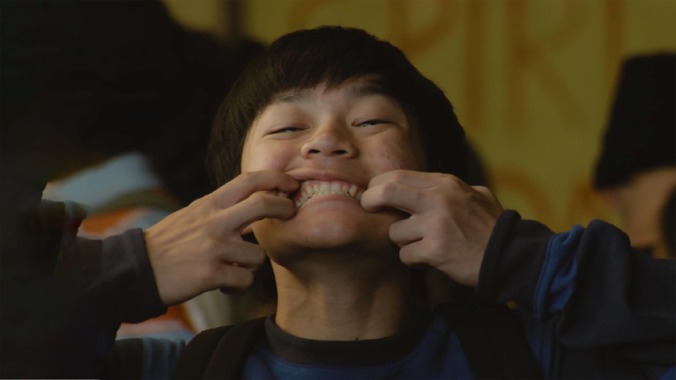Coming-of-Age Clichés Dull Dìdi‘s Absurd Amusement

As an Asian-American member of Gen Z, born and raised in California, Dìdi seems formulated to appeal to folks like me. Like Chris, the picture’s lead character, I’m a second-generation American who grew up on early aughts indie rock (though, not to impress a crush, I swear) and was a wannabe slacker from a type-A immigrant family. Perhaps this is where the problem lies, though. Rather than nailing down its perspective, Dìdi is too interested in catering to a wider audience.
There’s potential for something distinctive in its subjectivity—think of the shoddy, shaky camera footage of adolescent skateboarding that’s as amateur as the acts themselves. In Dìdi, development is occurring on multiple axes: technological, social and generational, and the film is best when it’s unmooring these at once. Dìdi is bogged down, though, by its reliance on coming-of-age clichés: sex and drugs as markers of maturity, family conflict that’s easily smoothed over, the struggle of forming an identity when one has an insecure sense of self.
Writer/director Sean Wang hits these expected beats, in doing so relinquishing a specific lens in favor of a cheap appeal to universality. There’s an axiom about universality that I find is always resonant: the more specific something is, the more universal it actually ends up being. In Dìdi, universality is the point, but in adopting common conventions and circumventing a specific eye, it foregoes the details that render its individuals truer to life.
Centering on Chris Wang (Izaac Wang), a younger likeness of filmmaker Sean Wang, Dìdi is set in Fremont, California in 2008. In the vein of other mid-aughts coming-of-age films, Dìdi is structured as a series of vignettes. Chris is 13, and accordingly, he’s experiencing the typical troubles of someone his age: navigating a crush on 14-year-old Madi (Mahaela Park), fighting with his older sister Vivian (Shirley Chen), and struggling to understand his first-generation mother Chungsing (Joan Chen).
Of course, these threads are complicated through myriad textural choices, ones rooted in Sean Wang’s own childhood. For one, Dìdi is interested in tracking how adolescent angst was documented through instant messenger, Myspace and Facebook, though this is etched in a cursory, nonspecific fashion rather than these serving as devices that demonstrate Chris’s interiority. It’s not that these inclusions feel contrived, but they do feel nonconsequential; these scenes are blips of retro-tech comedy but indicate little about Chris beyond him feeling a generic kind of social anxiety.
-

-

-

-

-

-

-

-

-

-

-

-

-

-

-

-

-

-

-

-

-

-

-

-

-

-

-

-

-

-

-

-

-

-

-

-

-

-

-

-








































